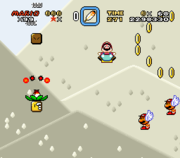Special Zone
- Not to be confused with Special World.
| Special Zone | |
|---|---|
Screenshot from Super Mario World | |
| Game | Super Mario World (1990) |
| Level(s) | 8 |
| << List of worlds >> | |

The Special Zone, also referred to as the Special World,[1] is the ninth and final area in Super Mario World that can only be accessed by a secret Star Road in Star World. The levels are located in various environments and are designed to be much more difficult to clear than all the other levels in the game. The names of the levels are also peculiar for Super Mario World stage names; they are all based on '80s slang (including Tubular, Mondo, and Way Cool). If Mario and Luigi clear all the levels, a new Star Road will appear and transport the plumbers back to Yoshi's Island, more specifically Yoshi's House.
The symbol at the top of the Special Zone is the Super Famicom logo. It is also the logo used for the PAL version of the SNES, which retained the original Japanese console and controller pad design and colors. In Super Mario World: Super Mario Advance 2, the logo is visible in the top left corner of the screen, but only after all levels in the Special Zone have been completed.
When playing Super Mario World: Super Mario Advance 2, completing the Special Zone will not transform the overworld, since that will only happen if the player finds all 96 exits.
A Message Block appears in the first stage of the Special Zone, stating that the player will receive a special present upon completing the Special Zone; upon doing so and returning to Yoshi's Island, the season will change from Spring to Fall (changing the color scheme of the environment), and several enemies will be completely transformed. In Super Mario World: Super Mario Advance 2, this message still appears. However, as the change only happens once all 96 exits in the game have been found, it instead refers to a different feature altogether: after the Special Zone has been completed, every time the player replays one of its levels, the bottom of the screen will display both the player's current and highest score in that level, as well as which character achieved the highest score. This feature does not appear outside the Special Zone.
Levels[edit]
Names in other languages[edit]
| Language | Name | Meaning | Notes |
|---|---|---|---|
| Japanese | スペシャルコース[?] Supesharu Kōsu |
Special Course | |
| スペシャルゾーン[2] Supesharu Zōn |
Special Zone | ||
| French | Parcours spécial[?] | Special courses | |
| German | Spezial-Welt[?] | Special World | |
| Italian | Mondo speciale[3] | Special world | |
| Zona Speciale[4] | Special Zone | ||
| Spanish | Zona Especial[?] | Special Zone |
Media[edit]
| File info 0:30 |
Trivia[edit]
- If the player waits on the map for two minutes, the music will transition from a simplistic tune to a rendition of the overworld theme from Super Mario Bros. The first part of the background music, coincidentally, was arranged as the Mystery Room theme for Super Mario Bros. Deluxe.
- In the Japanese version, there are only four stage names, with each being given to two consecutive stages.
- The names for all the courses in German all begin with "ex-".
- An arrangement of the Special Zone's music is used as the Course World menu's music in Super Mario Maker 2.
References[edit]
- ^ August 1991. Nintendo Mario Mania Player's Guide. Nintendo of America (American English). Page 36, 151, 156, 158-167.
- ^ December 10, 1992. 「任天堂公式ガイドブック スーパーマリオワールド」 (Nintendo Kōshiki Guidebook – Super Mario World). Tokyo: Shogakukan (Japanese). ISBN 4-09-104117-5. Page 134.
- ^ "Ora puoi vedere cosa si trova oltre il Mondo speciale!" – Super Mario World - Il gioco ha un nuovo look! description. Super Nintendo Entertainment System - Nintendo Switch Online. Nintendo (Italian).
- ^ November 15, 2018. Super Mario Bros. Enciclopedia. Magazzini Salani (Italian). ISBN 889367436X. Page 59.







